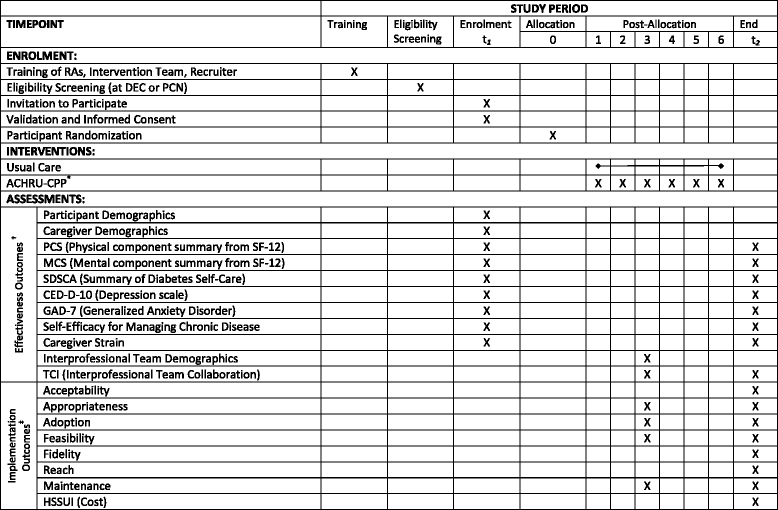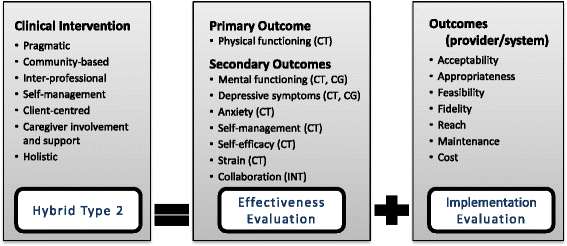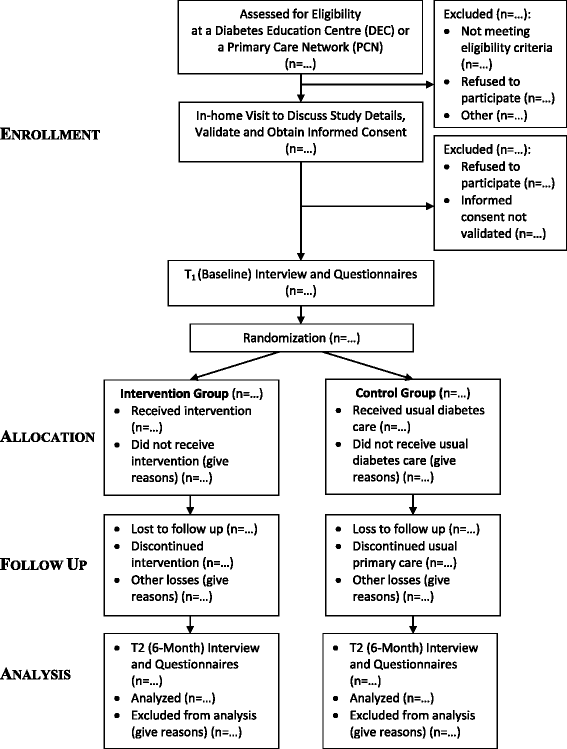The ACHRU-CPP versus usual care for older adults with type-2 diabetes and multiple chronic conditions and their family caregivers: study protocol for a randomized controlled trial
- PMID: 28166816
- PMCID: PMC5294729
- DOI: 10.1186/s13063-017-1795-9
The ACHRU-CPP versus usual care for older adults with type-2 diabetes and multiple chronic conditions and their family caregivers: study protocol for a randomized controlled trial
Abstract
Background: Many community-based self-management programs have been developed for older adults with type-2 diabetes mellitus (T2DM), bolstered by evidence from randomized controlled trials (RCTs) that T2DM can be prevented and managed through lifestyle modifications. However, the evidence for their effectiveness is contradictory and weakened by reliance on single-group designs and/or small samples. Additionally, older adults with multiple chronic conditions (MCC) are often excluded because of recruiting and retention challenges. This paper presents a protocol for a two-armed, multisite, pragmatic, mixed-methods RCT examining the effectiveness and implementation of the Aging, Community and Health Research Unit-Community Partnership Program (ACHRU-CPP), a new 6-month interprofessional, nurse-led program to promote self-management in older adults (aged 65 years or older) with T2DM and MCC and support their caregivers (including family and friends).
Methods/design: The study will enroll 160 participants in two Canadian provinces, Ontario and Alberta. Participants will be randomly assigned to the control (usual care) or program study arm. The program will be delivered by registered nurses (RNs) and registered dietitians (RDs) from participating diabetes education centers (Ontario) or primary care networks (Alberta) and program coordinators from partnering community-based organizations. The 6-month program includes three in-home visits, monthly group sessions, monthly team meetings for providers, and nurse-led care coordination. The primary outcome is the change in physical functioning as measured by the Physical Component Summary (PCS-12) score from the short form-12v2 health survey (SF-12). Secondary client outcomes include changes in mental functioning, depressive symptoms, anxiety, and self-efficacy. Caregiver outcomes include health-related quality of life and depressive symptoms. The study includes a comparison of health care service costs for the intervention and control groups, and a subgroup analysis to determine which clients benefit the most from the program. Descriptive and qualitative data will be collected to examine implementation of the program and effects on interprofessional/team collaboration.
Discussion: This study will provide evidence of the effectiveness of a community-based self-management program for a complex target population. By studying both implementation and effectiveness, we hope to improve the uptake of the program within the existing community-based structures, and reduce the research-to-practice gap.
Trial registration: ClinicalTrials.gov, Identifier: NCT02158741 . Registered on 3 June 2014.
Keywords: Community-based settings; Group-based programs; Health-related quality of life; Hybrid effectiveness-implementation design; Older adults; Pragmatic; Randomized controlled trial; Self-management; Type-2 diabetes mellitus.
Figures
Similar articles
-
The Aging, Community and Health Research Unit Community Partnership Program (ACHRU-CPP) for older adults with diabetes and multiple chronic conditions: study protocol for a randomized controlled trial.BMC Geriatr. 2022 Feb 4;22(1):99. doi: 10.1186/s12877-021-02651-7. BMC Geriatr. 2022. PMID: 35120457 Free PMC article.
-
Effectiveness of a community program for older adults with type 2 diabetes and multimorbidity: a pragmatic randomized controlled trial.BMC Geriatr. 2020 May 13;20(1):174. doi: 10.1186/s12877-020-01557-0. BMC Geriatr. 2020. PMID: 32404059 Free PMC article. Clinical Trial.
-
Older adults' experiences and perceived impacts of the Aging, Community and Health Research Unit-Community Partnership Program (ACHRU-CPP) for diabetes self-management in Canada: a qualitative descriptive study.BMJ Open. 2023 Apr 5;13(4):e068694. doi: 10.1136/bmjopen-2022-068694. BMJ Open. 2023. PMID: 37019487 Free PMC article. Clinical Trial.
-
Identifying and understanding the health and social care needs of older adults with multiple chronic conditions and their caregivers: a scoping review.BMC Geriatr. 2018 Oct 1;18(1):231. doi: 10.1186/s12877-018-0925-x. BMC Geriatr. 2018. PMID: 30285641 Free PMC article.
-
Efficacy of Nurse-Led Digitalized Diabetes Management Program for Community-Dwelling Patients With Type 2 Diabetes Mellitus: A Systematic Review and Meta-Analysis.J Nurs Scholarsh. 2025 Jun 3. doi: 10.1111/jnu.70022. Online ahead of print. J Nurs Scholarsh. 2025. PMID: 40462296 Review.
Cited by
-
The Aging, Community and Health Research Unit Community Partnership Program (ACHRU-CPP) for older adults with diabetes and multiple chronic conditions: study protocol for a randomized controlled trial.BMC Geriatr. 2022 Feb 4;22(1):99. doi: 10.1186/s12877-021-02651-7. BMC Geriatr. 2022. PMID: 35120457 Free PMC article.
-
Readiness for scale up following effectiveness-implementation trial: results of scalability assessment of the Community Partnership Program for diabetes self-management for older adults with multiple chronic conditions.BMC Health Serv Res. 2025 Feb 20;25(1):284. doi: 10.1186/s12913-025-12378-5. BMC Health Serv Res. 2025. PMID: 39979911 Free PMC article. Clinical Trial.
-
Effects of the Older Family Network Program on Improving Quality of Life Among Older Adults in Thailand.J Multidiscip Healthc. 2021 Jun 8;14:1373-1383. doi: 10.2147/JMDH.S315775. eCollection 2021. J Multidiscip Healthc. 2021. PMID: 34135595 Free PMC article.
-
Community Program Improves Quality of Life and Self-Management in Older Adults with Diabetes Mellitus and Comorbidity.J Am Geriatr Soc. 2018 Feb;66(2):263-273. doi: 10.1111/jgs.15173. Epub 2017 Nov 27. J Am Geriatr Soc. 2018. PMID: 29178317 Free PMC article. Clinical Trial.
-
Effectiveness of a community program for older adults with type 2 diabetes and multimorbidity: a pragmatic randomized controlled trial.BMC Geriatr. 2020 May 13;20(1):174. doi: 10.1186/s12877-020-01557-0. BMC Geriatr. 2020. PMID: 32404059 Free PMC article. Clinical Trial.
References
-
- International Diabetes Federation. IDF DIABETES Atlas. 6th ed. Basel: International Diabetes Federation; 2013. http://holl.handle.net/10536/DRO/DU:30060687.
-
- World Health Organization: World Health Organization Media Centre Diabetes Fact Sheet. http://www.who.int/mediacentre/factsheets/fs312/en/. Accessed 9 June 2016.
-
- World Health Organization. Definition, diagnosis and classification of diabetes mellitus and its complications. Part 1: diagnosis and classification of diabetes mellitus. Geneva; 1999. http://apps.who.int/iris/bitstream/10665/66040/1/WHO_NCD_NCS_99.2.pdf.
Publication types
MeSH terms
Associated data
Grants and funding
LinkOut - more resources
Full Text Sources
Other Literature Sources
Medical
Miscellaneous




